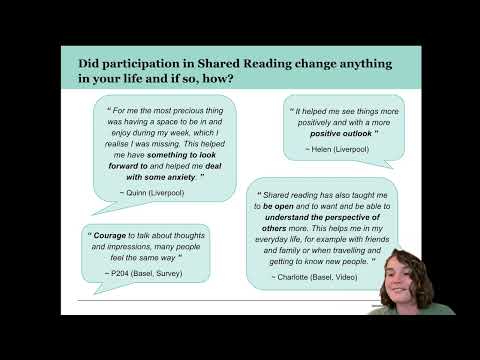 Speaker: Tina Ternes @TinaT
Speaker: Tina Ternes @TinaT
 Affiliation: Digital Humanities Lab, University of Basel
Affiliation: Digital Humanities Lab, University of Basel
 Co-authors: Antonia Vogler (Digital Humanities Lab, University of Basel) and Moniek Kuijpers (Digital Humanities Lab, University of Basel)
Co-authors: Antonia Vogler (Digital Humanities Lab, University of Basel) and Moniek Kuijpers (Digital Humanities Lab, University of Basel)
Title: The Effects of Shared Reading on Young Adults’ Well-Being and Reading Habits
Abstract : Shared Reading as an intervention has mostly been investigated with clinical samples, such as people suffering from chronic pain, depression or dementia (Billington et al., 2010; 2013; 2017). There are very few studies up to date exploring the effects of participation in Shared Reading on the well-being of healthy young adults. We aim to fill that gap by presenting a 10-week intervention study with young adults in Switzerland and the UK, to examine how participation in a Shared Reading group affected their well-being, with a particular focus on the concept of self-compassion.

 Long abstract
Long abstract
Introduction
As indicated by Billington et al., “[there is a] need for further research into the reported quality-of-life changes and suggested mechanisms whereby [Shared Reading] may affect improvements” (2016, p. 26). In this presentation, the emphasis will be precisely on the mechanisms and effects of Shared Reading in groups of healthy young adults ( between 18 and 25 years old), which have been under-researched. So far, Shared Reading as an intervention has mostly been studied with clinical samples, such as people suffering from chronic pain, depression or dementia (Billington et al., 2010; 2013; 2016), where the mean age lies much higher. This study compares the effects of participation in Shared Reading on well-being in two groups of young adults: one group in German-speaking Switzerland and one group in the UK, where the intervention originates and where most prior research on the efficacy of Shared Reading as a mental health intervention has been conducted.
Methods
We conducted a 10-week intervention study with two different samples, a group of young adults (between the ages of 18 and 25) in Basel, Switzerland (N = 6) and a group of young adults of the same age in Liverpool, UK (N = tbd). Both groups attended a “taster session” to get familiar with Shared Reading. After being briefed about the study, they filled in consent forms. They were asked to fill out a pre-test a week before the intervention started, in which we asked the participants about their reading habits using the Predictors of Leisure Reading Scale (Martin-Chang et al., 2021) and an adapted version of the Reading Habits Questionnaire (Kuijpers, Douglas & Kuiken, 2020). Their well-being was assessed using the short version of the Psychological Well-Being Scale (Ryff & Keyes, 1994) and a short version of the Self-Compassion Trait Scale (Raes et al., 2011). Additionally, we asked them to report any previous experiences with Shared Reading practices (such as a book club, or participation in online Shared Reading practices). The participants were then invited to a weekly 90-minute Shared Reading session over the course of 10 weeks. Each of these sessions were video recorded and observed by one researcher. They were led by trained and independent Reader Leaders. Shortly before each session, the participants were asked to fill out a short form State Self-Compassion Scale (Neff et al., 2021), and right after the session, they filled out this scale once more, alongside the newly developed Mechanisms of Shared Reading Questionnaire which measures 4 different mechanisms, namely Absorption, Interaction with the Text, Interaction with the Other Group Members, and Interaction with the Reader Leader. At the end of this weekly questionnaire, we asked the participants to describe how they found the session that week using two words or sentences. After the last session, the participants were sent a post-test. It contained the identical measures from the pre-test, but with additional open questions about their Shared Reading experience, how they felt about sharing thoughts and feelings with the group, whether they felt their relationships to the other group members changed over time and whether they noticed any changes in their daily life due to their participation. A week after the last session, they were invited to participate in a focus group interview where we asked them about their experience with Shared Reading.
Conclusion
As we are currently still in the process of collecting data with the Swiss-German sample, and data collection in Liverpool is planned to start in January, we cannot share any results yet. We can share what we are planning to address in this presentation. First,we will describe our samples in terms of age, gender, reading habits and context. Our group in Basel participated within an educational context, whereas the group in Liverpool will not, which will make for an interesting comparison. Then we will compare the scores on psychological well-being and trait self-compassion between pre- and post-test, to see whether the overall intervention had any effects. We will run correlation analyses to determine whether self-compassion and well-being are positively correlated to confirm whether we can use the self-compassion scales as indicators of psychological well-being. In a further step we will compare the scores on state self-compassion before and after each session to uncover the session that led to the strongest increase in self-compassion and the one that led to the weakest increase (or strongest decrease) and look further into the scores of the different mechanisms at play during both those sessions. We hope to discover which mechanisms seem most suited as mediators for positive effects on self-compassion and by extension psychological well-being.

